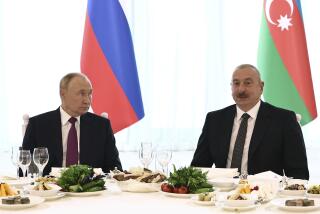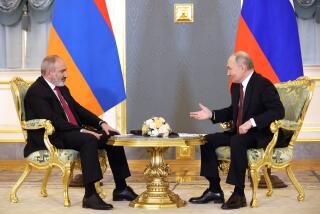Russia, Japan seek to resolve dispute over islands, WW II treaty
- Share via
MOSCOW -- Russian President Vladimir Putin and Japanese Prime Minister Shinzo Abe continued their quiet negotiations Saturday to bring an end to their nations’ World War II dispute over four Pacific islands, a disagreement that has hampered relations between the two nations for nearly 70 years.
Amidst shifting diplomatic dynamics in the Asian Pacific region, Putin and Abe met on the fringes of the Winter Olympic Games in the southern Russian resort of Sochi to discuss improving trade ties and how to resolve conflicting sovereignty claims to the islands.
No breakthrough agreements were reached between the two countries that both count ascendant China as a regional rival. But the positive spin attached to the fifth Putin-Abe meeting in just over a year heralded new possibilities to put an end to one of the region’s longest-running disputes.
Abe was quoted by reporters in Sochi as saying the pace of negotiations over the islands in recent months “has been very fast” and that Tokyo is keen to maintain that momentum.
“We should not kick this can down the road,” Abe said, the Associated Press reported from the one-day summit venue. Likewise, Russian media cast the meeting as another advance in warming ties between Moscow and Tokyo.
“Our bilateral relations are developing consistently and in a constructive manner, we cooperate in a number of international organizations, and this cooperation is very successful and fruitful,” Putin said.
Resentment over the dual claims to the islands remains high. Soviet troops seized the islands that Russians call the Southern Kuriles just before the Japanese surrender in 1945 and expelled some 17,000 Japanese who called the rugged islands home. Tokyo, which considers the islands its historic Northwest Territory, had dealt with the loss in silent suffering since the war’s end.
Any upgrade of Russia-Japan ties would likely be regarded warily by China, and perhaps by some in Washington and in the countries that also have ongoing territorial disputes in the Eastern Pacific, including South Korea, Vietnam, the Philippines and Brunei.
And Putin, who has already irked Washington by granting temporary asylum to NSA leaker Edward Snowden and blocking U.S. adoption of Russian orphans, probably wouldn’t mind luring staunch U.S. ally Japan deeper into its political and economic orbit.
“All this provides good preconditions for resolving even the most complicated issues between the two states,” Putin said of his country’s relations with Tokyo, according to the Voice of Russia news site.
The Saturday summit ended in agreement that Putin will visit Japan later this year to continue work on the two states’ relations, Japan’s NHK television reported.
Twitter: @cjwilliamslat
More to Read
Sign up for Essential California
The most important California stories and recommendations in your inbox every morning.
You may occasionally receive promotional content from the Los Angeles Times.











